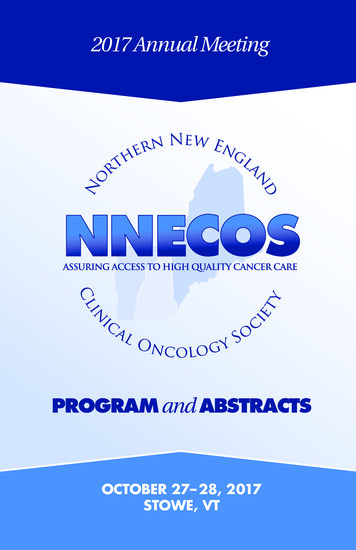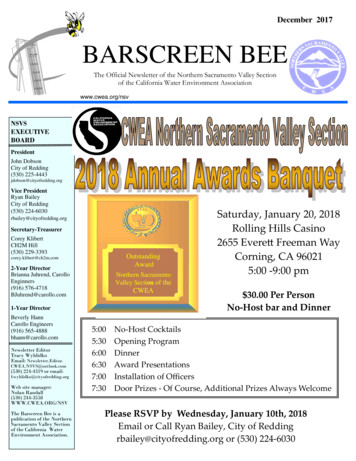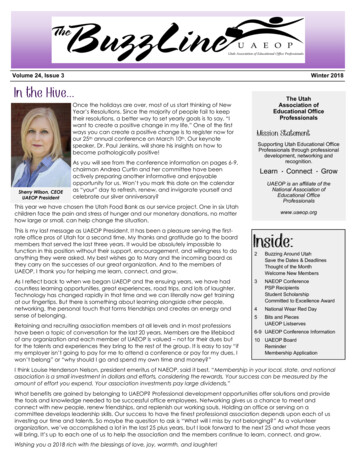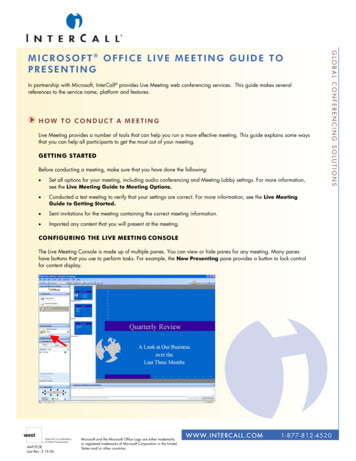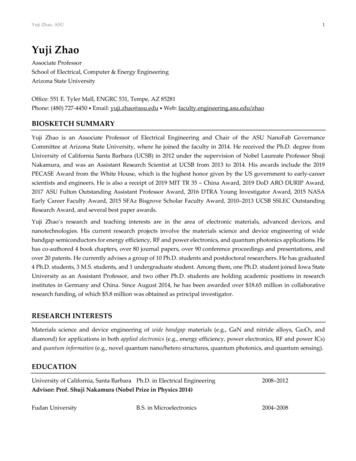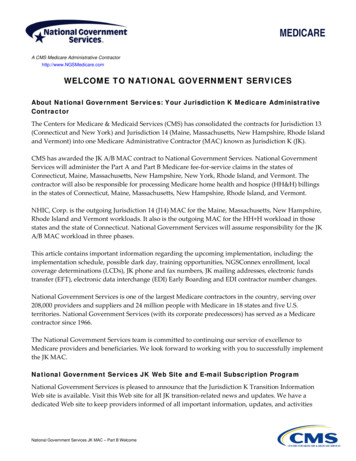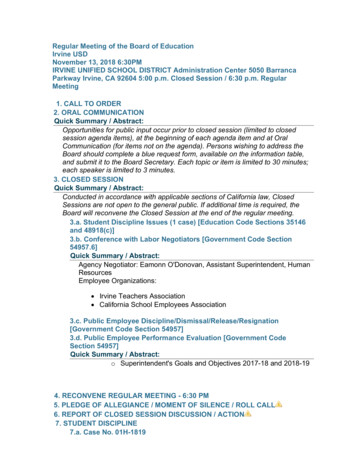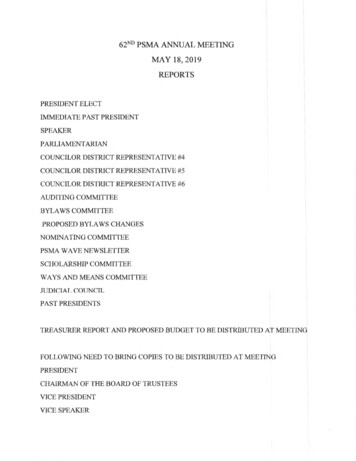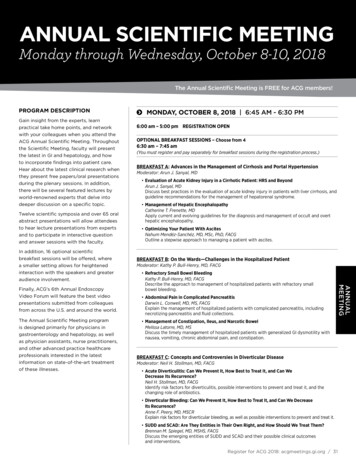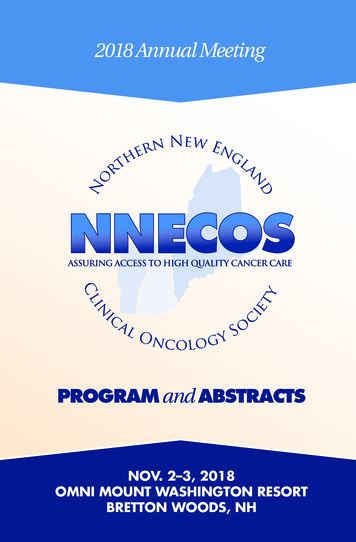
Transcription
2018 Annual MeetingPROGRAM and AbstRActsNov. 2–3, 2018omNi mouNt WashiNgtoN ResoRtBRettoN Woods, NhVolume 13NNECOS 2018 Annual Meeting Program & Abstract Book1
te!aeDhteSavthe NortherN New eNglaNdCliNiCal oNCology SoCietyinvites you to save this date for education in 2019Saturday, March 23, 2019SpriNg MeetiNg& oCN review CourSeiNNovatioNS iN CaNCer CareGrappone Center / Concord Courtyard70 Constitution DriveConcord, NH 03301www.grapponeconferencecenter.comTentative Topics: Radiation Oncology fromSimulation to Treatment Patient Stories ASCO Update Interdisciplinary Approachto Patient Care Innovative Abstracts Clinical Trials in theCommunity Setting219or 3, 20fck h 2tra arcllle , Mra dayap urtSaoCNreview CourSewith optional Friday 7:00 pm session* Test Taking Strategies* Symptom Management* Carcinogenesis, Epidemiology,Detection Hematologic Malignancies Oncologic Emergencies Solid Tumors Survivorship Psychosocial Sexuality IssuesNNECOS 2018 Annual Meeting Program & Abstract BookVolume 13
Welcome to Bretton Woods and the2018 NNECOS Annual Meeting!Thank you for joining us at this year’s annual meeting at the Omni Mt.Washington Resort. Our planning committee is pleased to present this year'sprogram, filled with more choices of meaningful content to bring back toyour practice. We invite you to take advantage of the additional networkingtime built into the schedule to network with colleagues from across theregion while enjoying the beauty of this historic property.As you partake in the refreshments in the Presidential Foyer and GardenCorridor areas, we ask that you please take the time to visit with ourexhibitors and thank them for supporting this meeting. A special noteof thanks to the 26 companies supporting the society through corporatemembership this year!At the conclusion of the meeting, we ask that you complete and submit youronline evaluation, allowing you to obtain educational credit, and providingfeedback to help shape future educational events.2018 Annual Meeting Planning CommitteeSteven Ades, Lori Aubrey, Diana Barnard, Amelia Cullinan, Emma Dann,Victoria Forbes, Andrew Hertler, Kathy McBeth, Elizabeth McGrath, NicoleMessier, Carl Nelson, Tom Openshaw, Sunil Patel, Shirley Roy, StephenRust, Amy Stansfield, Christian Thomas, Paul Unger, Doug Weckstein,Tracey Weisberg, Marie WoodCONTENTSWelcome. 3Attendee Information Page /Online Materials. 4Agenda. 5Abstract Table of Contents. 8Annual Meeting Abstracts. 12Member Practices. 54Thank You Corporate Members. 55Volume 13NNECOS 2018 Annual Meeting Program & Abstract Book3
Go Green with NNECOS!Attendee Information ctswww.nnecos.org/omni4NNECOS 2018 Annual Meeting Program & Abstract BookVolume 13
NNECOS 2018 Palliative Care SymposiumFRIDAY, NOVEMBER 2, 20187:30 AM REGISTRATION CHECK INGreat Hall7:30 AM - 8:30 AM CONTINENTALBREAKFAST / COFFEE / EXHIBITSPresidential Foyer8:00 AM - 8:50 AM Keynote:Realigning Cancer Care toAddress Interactional SufferingMonroe/MadisonDebra Parker-Oliver, PhD, MSWUniversity of Missouri9:00 AM - 9:50 AMPrognostication in Age ofImmunotherapy Panel: How doesit affect the conversation?Monroe/MadisonSteven Ades, MD - UVM Medical CenterKeisuke Shirai, MD, MSc - DHMCStephen T. Rust, MD, FACP, FAAHPMCapital Region Palliative Care and Hospice9:50 AM - 10:20AM REFRESHMENTBREAK / EXHIBITS / NETWORKINGPresidential Foyer & Garden Corridor10:20 AM - 11:05 AMUnderstanding Requests forMedical Aid in DyingGrand Ballroom SouthDiana Barnard, MD - University ofVermont Medical CenterPaul Unger, MD - Champlain ValleyHematology Oncology11:15 AM - 12:00 PMHospice 101Grand Ballroom SouthAndrea Patrick-Baudet, MBA, RN,CHPN, CHPCA - Concord Regional VisitingNurse Association12:00 PM LUNCHPresidential BallroomEXHIBITS/NETWORKING/DESSERTGarden Corridor/Presidential FoyerNNECOS 2018 Annual MeetingFRIDAY, NOVEMBER 2, 201811:00 AM - 5:30 PMREGISTRATION CHECK INGreat HallEXHIBITS/NETWORKINGGarden Corridor/Presidential Foyer12:00 PM LUNCHPresidential Ballroom12:45 PM WELCOMEChristian A. Thomas, MD - PresidentVolume 131:00 - 1:45 PM CONCURRENT SESSIONSMolecular TestingGrand Ballroom SouthKaren Rasmussen, PhD, FACMGSpectrum HealthcareSupportive Care, NCCNAntiemetic GuidelinesPresidential BallroomMeenakshi Shelat, PharmD - DHMCNNECOS 2018 Annual Meeting Program & Abstract Book5
NNECOS 2018 Annual MeetingFRIDAY, NOVEMBER 2, 20181:55 - 2:45 PM CONCURRENTSESSIONSMolecular Tumor BoardMonroe/MadisonKaren Rasmussen, PhD, FACMGSpectrum HealthcareChristian A. Thomas, MDNew England Cancer SpecialistsCatherine Del Vecchio Fitz, PhDDana-Farber Cancer InstitutePelvic Rehab for Cancer PatientsReagan RoomFalguni Vashi PT, DPT, PRPC- St. Joseph Hospital2:45 - 3:15PMEXHIBITS/NETWORKINGGarden Corridor/Presidential Foyer3:15 - 4:00 PM CONCURRENTSESSIONSNew Drug UpdatePresidential BallroomRob Cade, PharmD - UVM MedicalCenterKatie Karkowski,PharmD - DHMCMegan Derba, PharmD - NorthernLight Cancer InstituteIssues in Disparate PopulationsJefferson RoomChristine Howard LICSW,OSW-CHome Health & Hospice CareCharlene Forcier - DHMCAysha Sheikh RN, MPH - MaineCancer Foundation64:05 - 4:35 PM - Global Issues inOncology: Bangladesh UpdatePresidential BallroomTracey F. Weisberg, MD - New EnglandCancer Specialists4:35 - 5:00 PM REFRESHMENTBREAK / EXHIBITS / NETWORKINGGarden Corridor/Presidential Foyer5:00 PM - 5:50 PM ELAINETOWLE LECTURE: Health CareReform: Back to Basics?Grand Ballroom NorthKavita Patel, MD, MS - The BrookingsInstitution6:00 PM - 7:00 PM ABSTRACTPOSTER SESSION & COCKTAILRECEPTIONConservatory & Great Hall7:00 PM DINNER PROGRAMGrand BallroomSTEVEN M. GRUNBERGMEMORIAL KEYNOTE: Updateon Oncology PolicyBarbara McAneny, MD - AmericanMedical Association9:00 PM ANNUAL BUSINESSMEETING OF MEMBERSHIP(Immediately following Grunberg Keynote)NNECOS 2018 Annual Meeting Program & Abstract BookVolume 13
NNECOS 2018 Annual MeetingSATURDAY, NOVEMBER 3, 2018SPECIAL INTEREST BREAKFASTS 6:30 AM Platinum RoundtableJefferson/Reagan - by Invitation 7:00 AM Fellows BreakfastWashington Board Roomall fellows/trainees welcome7:15 AM - 8:30 AMREGISTRATION CHECK-IN - Great HallBREAKFAST - Grand Ballroom NorthEXHIBITS/NETWORKINGGarden Corridor / Presidential Foyer8:30 AM - 9:20 AM CONCURRENTSESSIONSAdvances in Cancer Imaging: TheNew Technologies in Clinical UseGrand Ballroom SouthSusanna I. Lee, MD, MPHMassachusetts General Hospital/Harvard Medical SchoolEthical Considerations in OncologyMonroe/MadisonModerator - Elizabeth B. McGrath,DNP, APRN - DHMCPanelists - DHMCSivan Rotenberg PhDCathy Rodreguiz MSN, RN, CNL, OCNMatthew Wilson, MD9:30 AM CONCURRENT SESSIONSWhat's New in SurgicalOncology?Grand Ballroom SouthChristina V. Angeles, MD FACSDHMCTransgender patients and cancercare - Monroe/MadisonVolume 13Diane Koeller, MS, MPH, LCGCDana Farber Cancer Institute10:10 - 10:40 AM EXHIBITS /REFRESHMENTS / NETWORKINGGarden Corridor / Presidential Foyer10:40 AM - 11:40 AM Breast CancerMulti-Modality Tumor Board CaseDiscussions - Presidential BallroomTracey F. Weisberg, MD - New EnglandCancer SpecialistsPaige Teller, MD - Maine Medical CenterChiara Battelli, MD - New EnglandCancer SpecialistsJulian Johnson, MD - Spectrum MedicalGroup11:45 AM - 12:45 PMAbstract Podium PresentationsPresidential BallroomModerator - Ken Meehan, MD - DHMCSabrina Caramando, Research InternNew England Cancer SpecialistsCharles Nicoli, BS - Larner College ofMedicine at the University of VermontRodwell Mabaera, MD - DHMC Norris Cotton Cancer Center12:45 PM LUNCH / AWARDS /PLENARY SESSION - Grand Ballroom1:15PM - 2:15PM CAREER BURN OUT& SELF PRESERVATION STRATEGIESDarshan Mehta, MD, MPH - BensonHenry Institute for Mind Body Medicine2:15 PM NETWORKINGRECEPTION - Grand Ballroom FoyerNNECOS 2018 Annual Meeting Program & Abstract Book7
NNECOS 2018 Annual Meeting Abstracts: Volume 13Table of ContentsCASE REPORTSImmune-mediated toxicity of pembrolizumab: A case of myasthenia gravisA. Baronner, R. Zhang, K. Shirai. 12A rare case of Di Guglielmo syndrome with refractory thrombocytopeniaB. Batukbhai, R. Ramkissoon, C. Locke Jr., et al. 12Case series of treatment-related MDS/AMLB. Batukbhai, A. Caffrey, et al. 13Comprehensive management of a patient with decreased shoulder function and a historyof breast, lung, and neck cancer: a case studyA. Chongaway, A. Litterini. 14Fatal delayed diagnosis of Hemaphagocytic Lymphohistiocytosis in a stroke patientA. Donovan. 15Advances in Metastatic Melanoma: The Role of Immunotherapy and MetastasectomyV. Forbes, K. Shirai, C. Angeles. 15Refractory hemolytic anemia: a case of paroxysmal cold hemoglobinuriaA. Gathany, A. Budavari, J. Larsen. 16A rare case of a myeloid mutation expressed in T-cell acute lymphoblastic leukemiaL. Giscombe, M. Keating, A. DeSouza, et al. 17Insulin-related amyloidosis in a patient with type 2 diabetes and colon cancer.A. Harb, A. Garrett . 18Conservative medical management of pneumatosis intestinalis in association with graftversus-host disease after allogeneic stem cell transplantD. Huang, M. Wesley, J. Hill Jr . 18Cutaneous presentation of a T Lymphoblastic LymphomaX. Bruno . 19Cutaneous T-cell lymphoma lesions with superimposed Norwegian scabiesM. Keating, L. Giscombe, N. Reddy, et al. 19Mixed Epitheliod Trophoblastic Tumor and Choriocarcinoma, a Diagnostic ConundrumK. Victoria, H. Rehman . 20Acute Oxaliplatin Immune-Induced Syndrome: A Case ReportS. Waldstein, C. Gilkey, M. Barry. 21GENETIC TESTING, MOLECULAR FINDINGSCommunity oncology clinicians’ knowledge, beliefs, and attitudes regarding genomic tumortestingE. Anderson, K. Murray, H. Mandeville, et al. 22Genetic Testing Process ImprovementK. Hall, M. Clements. 228NNECOS 2018 Annual Meeting Program & Abstract BookVolume 13
MET amplification in non small cell lung cancer: experience of a single institution in MaineA. Harb, A. Curtis. 23Next generation sequencing in detecting KRAS and p53 mutations in non-small cell lungcancer patients from rural MaineA. Harb, L. Skacel, M. Babcock, et al. 24NSCLC: Acquisition Of Potentially Novel Resistance MutationsW. Jehangir, F. Khan, D. Seward. 24The effect of extended genomic panel testing on treatment decisions for patients withmetastatic breast, lung or colon cancerC. Lyall, C. Thomas. 25Physician-patient communication about genomic tumor testing: perceptions of oncologyprovidersH. Mandeville, E. Anderson, K. Murray, et al. 26Assessment of digital PCR for single day HER2 assessmentP. Shah, J. Sands, S. Murarka , et al. 27IMMUNOLOGY, CHECKPOINT INHIBITORSPerplexing case of immune checkpoint inhibitor-related side effectsB. Batukbhai, P. Shah, K. Shirai . 27A Pilot Trial Examining Myeloid-Derived Suppressor Cells and Immune CheckpointRegulators' Expression in Allogeneic Stem Cell Transplant Recipients Using MyeloablativeBusulfan and Fludarabine*R. Mabaera, K. Wilcox, L. Root, et al. 28Atypical AIDP in the setting of pembrolizumab treatmentS. Muralikrishnan, L. Ronan, S. Coker, et al. 29Cancer patients receiving immunotherapy who present to the Emergency Room; ATreatment Paradigm ShiftL. Pistorino, J. Dallacosta, P. Skeffington, et al . 30SUPPORTIVE CARE ISSUES – SCREENING, CARE MODELS, COSTSOF CARE, RURAL CARE, BEHAVIOR MODIFCATIONSExercise Interventions for Breast Cancer (BC) Patients in Rural Areas: The Northern NewEngland (NNE) ExperienceB. Batukbhai, M. Stannard, A. Donovan, et al. 30Providing Food Assistance to Early Stage Breast Cancer Patients With Food InsecuritySignificantly Improves Their Adherence to Adjuvant Therapy*S. Caramando, E. Longnecker, et al. 31Short-term oncologic outcomes of an Enhanced Recovery After Surgery protocol forcolorectal cancer patients in a community hospital settingK. Cole, M. Toland. 32Professional Practice Environment of Nurses in Community Ambulatory Oncology Settings:An Exploratory AnalysisE. Dann. 33Volume 13NNECOS 2018 Annual Meeting Program & Abstract Book9
Lung cancer screening at a community hospital in eastern and northern MaineA. Harb, G. Keller, J. Klemperer. 33Patient Reported Outcomes in Hematopoetic Stem Cell Patients: A Pilot ProjectC. Hayes, K. Meehan, A. Tosteson, et al. 34Best Practice Medication Reconciliation in the Outpatient SettingM. Hession. 35Utility of Breast Cancer Index (BCI) in the clinical practiceS. Kodali, K. Dittus, E. Tipirneni . 35Association of behavioral counseling with sun protection use in adults: results of a surveyK. Lehmann, K. Cole. 36A survey of hospice and palliative care nurses’ and holistic nurses’ perceptions ofspirituality and spiritual careE. McGrath, J. Lukovsky, M. Beauchesne. 37Fighting Two Battles: An Analysis of Caregivers’ Out-Of-Pocket Costs FollowingTransplantationJ. Meehan, K. Wilcox, L. Root, et al . 38m-Palliative Care Link: A mobile application to improve assessment of and communicationregarding symptom control among late-stage Tanzanian cancer patientsS. Miesfeldt, R.Morse, S. Sagan, et al. 38Malnutrition screening: A Screening Tool for Outpatient Oncology PatientsJ. Mills. 39Association of rurality with survival and receipt of treatment in early-stage non- small celllung cancer patients in the United States*C. Nicoli, B. Sprague, N. Lester-Coll. 40Palliative care utilization in patients with pancreatic cancer: A retrospective chart review atan academic tertiary-care centerV. Pauer, E. McGrath . 41Realizing the Benefits of an Integrated Care Model through the “white bagging” process ina community based Oncology Clinic PharmacyD. Raymond, P. Skeffington, et al . 41Maine’s impact cancer network enables statewide collaborationA. Sheikh, H. Drake. 42Feasibility of opioid risk screening in an oncology clinic: A pilot studyL. Teulings, M. Storms, K. Beloin, et al. 43Interim analysis of the Impact of a Serious Illness Communication Skills Training in HematologyOncology Fellowship on Discussion and Documentation of Patient Values and GoalsG. Wasp, T. Meehan Jr, A. Cullinan, et al. 43Increased Health Care Costs Associated with Venous Thromboembolism in Patients withMalignant GliomaH. Wright, C. Holmes, A. Thomas. 4410NNECOS 2018 Annual Meeting Program & Abstract BookVolume 13
TREATMENT, CHEMO REGIMENTS, TREATMENT PARADIGMSPalbociclib Plus Endocrine Therapy (ET) in Hormone Receptor–Positive (HR ), HumanEpidermal Growth Factor Receptor 2–Negative (HER2–) Advanced Breast Cancer (ABC):Updated Summary of the PALOMA Clinical ProgramE. Bananis, R. Finn, N. Turner, et al. 45Treatment Intensity and Length of Stay in Elderly Acute Leukemia PatientsA. Baronner, C. Hayes. 46Review of first line treatments for stage I non-small cell lung cancer patientsA. Harb, M. Soliman, A. Curtis. 46Review of the treatment milestones for stage I non-small cell lung cancerA. Harb, G. L’Italien, et al. 47Review of treatment milestones for head and neck cancer at a regional rural cancer centerA. Harb, G. L’Italien, et al. 48Early Experience with Vyxeos: Clinical and Practical ConsiderationsC. Hayes, K. Karkowski. 48Fluconazole prophylaxis and invasive fungal infections in AML patients receivinginduction/consolidation chemotherapyS. Kodali, W. Jehangir, D. Douce, et al. 49Man vs Machine: Efficacy of Neulasta vs Onpro at the University of Vermont Cancer CenterD. Krakauer, D. Douce, H. Ng, et al . 50Evolving conditioning for allogeneic stem-cell transplants in the treatment of myeloidmalignancies Experience from a Single, Rural-Based Transplant CenterA. Briand, D. McKenna, D. McKenna, et al. 50Hematopoietic stem cell transplant for advanced myelofibrosisD. R McKenna, C. H Lowrey, C.Ann Hayes, et al . 51Prophylactic anticoagulation and bleeding risk in ambulatory cancer patients on cancerdirected therapyA. Wilks, D.Douce, C. Holmes. 52* Indicates abstract selected for podium presentation.NNECOS 2018 Annual Meeting AbstractsThe Northern New England Clinical Oncology Society (NNECOS) is pleasedto present these outstanding abstracts from across the region and beyondin this our thirteenth year of the abstract program. These abstracts havebeen reviewed by the NNECOS abstract committee and approved by theNNECOS Board of Directors for presentation at this year’s meeting. Thanksto all who took the time to share information and ideas with colleaguesthrough this means. We’ll look forward to another group of abstracts forpresentation at our 2019 Annual Meeting.Volume 13NNECOS 2018 Annual Meeting Program & Abstract Book11
CASE REPORTSImmune-mediated Toxicity of Pembrolizumab: ACase of Myasthenia GravisA. Baronner, R. Zhang, K. ShiraiDartmouth Hitchcock Medical Center, Dartmouth Geisel School of MedicineBackground: Pembrolizumab, a checkpoint inhibitor that blocks programmed celldeath receptor 1 (PD-1), has been approved by the FDA for treating malignancies suchas melanoma and non-small cell lung cancer. Pembrolizumab can cause immunemediated adverse events such as pneumonitis, colitis, hepatitis, and endocrinopathies.Although rare, myasthenia gravis is an emerging and potentially fatal adverse eventassociated with pembrolizumab.Methods: An 87-year-old gentleman with metastatic melanoma who had received twocycles of pembrolizumab presented with sudden-onset left facial droop, left ptosis,diplopia, and head drop. CT head and MRI were negative for acute infarct, intracranialhemorrhage, or intracranial metastases. Troponin-T and CPK elevation promptedworkup with cardiac MRI, which was negative for myocarditis. Laboratory findingswere also significant for transaminitis.Results: We suspected the etiology of this presentation to be pembrolizumabassociated myasthenia gravis despite negative acetylcholine receptor antibody.Electromyography revealed neuromuscular junction defect affecting the ocularmuscles, proximal muscle myopathy, and peripheral neuropathy consistent withmyasthenia gravis. Treatment with pyridostigmine 30mg TID and prednisone 20mgdaily was initiated. Respiratory function was monitored with negative inspiratory forcemeasurement. Left ptosis, facial droop, and bulbar muscle weakness have subjectivelyimproved with ongoing treatment.Conclusions: Myasthenia gravis is a rare but emerging form of immune-mediatedadverse events secondary to checkpoint inhibitors such as pembrolizumab. Troponinand CPK elevation may be related to myasthenia gravis. Close monitoring and prompttreatment are indicated given the fatal consequence of ventilatory failure secondaryto respiratory muscle weakness.A Rare Case of Di Guglielmo Syndrome withRefractory ThrombocytopeniaB. Batukbhai, R. Ramkissoon, C. Locke Jr., R. Zhang, M. GautierDartmouth Hitchcock Medical CenterBackground: Giovanni Di Guglielmo first described pure erythroid leukemia (PEL),a rare and aggressive form of acute leukemia, in the early 20th century. PEL is12NNECOS 2018 Annual Meeting Program & Abstract BookVolume 13
characterized by the presence of 80% of erythroid precursors in the bone marrow, ofwhich 30% or more are proerythroblasts.Methods: A 44-year-old female was transferred from the referring hospital withprofound anemia, thrombocytopenia that was refractory to platelet transfusionand transaminitis. Imaging was remarkable for a uterine leiomyoma, bilateralhemorrhagic ovarian cysts and ascites; she was also noted to have hepatomegaly butnot splenomegaly. Bone marrow biopsy performed revealed almost 100% cellularitywith 80% erythroid precursors and abnormal megakaryocytes. Staining also revealedsignificant fibrosis of the marrow. Cytogenetics studies could not be performed due toinsufficient sample.Results: Patient was diagnosed with acute erythroid leukemia and was treated withthe 7 3 chemotherapy regimen. She received IVIG and prednisone for presumedimmune-related thrombocytopenia, without improvement. Screening for alloantibodies was negative. Repeat CT abdomen showed new splenomegaly, hence therefractory thrombocytopenia was attributed to sequestration as well as decreasedproduction. The transaminitis was thought to be from extramedullary involvement ofthe liver. Patient is currently scheduled for day 14 bone marrow biopsy to evaluate herresponse to the induction chemotherapy.Conclusions: PEL is a rare leukemia associated with poor prognosis with standardinduction chemotherapy. Patients with PEL often present with profound cytopeniasand have complex cytogenetics and poor-risk molecular abnormalities. Allogeneicstem cell transplantation should be considered if remission is achieved as they havehigh risk for relapse.Case series of treatment-related MDS/AMLB. Batukbhai, A. Caffrey, B. Hale, C. HayesDartmouth Hitchcock Medical CenterBackground: About 5-20% of patients who received chemotherapy or radiation forprior conditions develop secondary treatment-related MDS or AML(t-MDS/AML).T-MDS/AML is typically associated with abnormal cytogenetics and therefore carriesa poorer prognosis than conventional AML. Historically, these conditions wereclassified based on the cytotoxic exposure, however with the 2008 revision of WHOclassification, they are now classified based on cytogenetic changes.Methods: We present a case series of 6 patients who developed t-MDS/AML followingvarious cytotoxic treatment regimens. These patients were seen in the hematologyclinic or inpatient ward at our institution over the last 3 years.Results: We included 3 patients with breast cancers, 2 with lymphoma and 1 withmultiple myeloma.The average age of the patients 56.5 years (range 53-65). The time from the initialchemotherapy to the development t-MDS/AML ranged from 9 to 69months. 3patients had received anthracycline-based treatment, 2 with bendamustine-basedregimens and 1 with Cytoxan conditioning. All but one patient presented with t-AML.Volume 13NNECOS 2018 Annual Meeting Program & Abstract Book13
2 patients were positive for MLL/11q23 rearrangement, while 2 other patients hadcomplex karyotypes. Interestingly, the MLL/11q23 rearrangement was associated withthe shortest time (9-10 months) to the development of the t-MDS/AML. 5 patientshad received G-CSF with their prior chemotherapy, while 4 had prior smoking history.Conclusions: Cytotoxic treatment such as alkylating agents, anthracyclines andtopoisomerase inhibitors are associated with higher risk of t-MDS/AML, which isassociated with poor prognosis. Hence, there is increasing necessity to study potentialbiomarkers/genetic markers to identify patients at higher risk of developing t-MDS/AML.Comprehensive management of a patient withdecreased shoulder function and a history of breast,lung, and neck cancer: a case studyA. Chongaway, A. LitteriniUniversity of New EnglandBackground: Cancer treatments can have late effects on the musculoskeletal,cardiopulmonary, nervous, and integumentary systems. This case report describescomprehensive physical therapy (PT) management of decreased shoulder functionfor a patient with a history of breast, lung, and tongue cancers treated with surgery,chemotherapy, and radiation.Methods: The patient was a 71-year-old female referred to outpatient PT for rightshoulder and neck pain with the goals to reduce pain and increase functional mobility.Local cancer treatment occurred to the right upper quadrant for multiple cancers.Outcome measures included the Upper Extremity Functional Scale (UEFS), theNumeric Pain Rating Scale (NPRS), range of motion (ROM) assessment and strengthtesting Interventions included manual therapy, therapeutic exercises, and aquatictherapy.Results: The patient received nine visits of skilled PT. At discharge, she demonstratedimprovement in right shoulder flexion ROM (146 to 155 degrees) and strength (4/5to 4 /5). She reported improvements in lifting overhead, though her UEFS scoreimproved minimally (72/80 to 74/80). On the NPRS, her pain decreased (6/10 to 1/10).Conclusions: This case report described a comprehensive PT plan for decreasedshoulder function in a patient with a history of multiple cancers. Late effects of cancertreatment can have a significant impact on a patient’s ability to complete essentialactivities of daily living and substantially decrease quality of life. Research has shownPT to be beneficial in mitigating these late effects, and therefore, rehabilitation shouldbe included in the comprehensive care of cancer survivors.14NNECOS 2018 Annual Meeting Program & Abstract BookVolume 13
Fatal delayed diagnosis of HemaphagocyticLymphohistiocytosis in a stroke patientA. DonovanDartmouth Hitchcock Medical CenterBackground: Diagnosis of Hemaphagocytic Lymphohistiocytosis (HLH) is often delayeddue to its non-specific diagnostic criteria and unfamiliarity with the syndrome;however, early diagnosis is essential for treatment. Here we present a case of adelayed diagnosis despite an unexplained fever of 3 weeks in an ICU patient.Case Presentation: A 68 year old woman presented with weakness and was found tohave a stroke. Within 3 days, she developed fevers, hemoptysis, and ARDS requiringintubation. Fevers and ongoing respiratory failure persisted for 3 weeks despiteextensive infectious workup (negative bacterial cultures, viral studies, and imaging)and empiric b
Volume 13 NNECOS 2018 Annual Meeting Program & Abstract Book 1 2018 Annual Meeting PROGRAM and AbstRActs Nov. 2-3, 2018 omNi mouNt WashiNgtoN ResoRt
